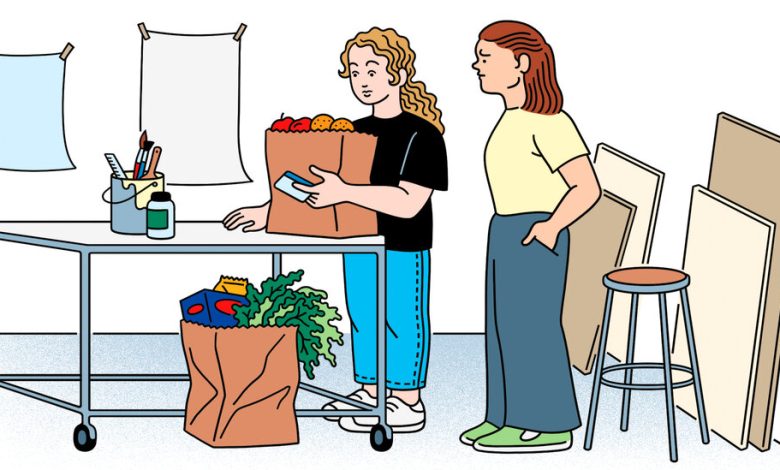Is It OK to Get Food Stamps When You’re Just Pursuing Your Passion?

A friend of mine is an amateur painter. She has a degree from one of the best colleges in the country (where she earned top grades), and she is able-bodied and healthy. After college, she decided to pursue painting, which is her passion. While she hopes to work professionally as an artist, she is currently working a part-time teaching job. She comes from an upper-middle-class household, and I know she has received some monetary support from her parents in the past. She does not live lavishly by any means, but she lives in a comfortable apartment with roommates and rents a separate art studio. I admire her for pursuing her art and have no problem with her receiving support from her parents as she works on her painting.
Recently, my friend told me that she uses the federally funded Supplemental Nutrition Assistance Program (SNAP) to purchase food for herself. I feel that this is dishonest and using the welfare system in a way that hurts those who need it most. When I expressed my concern, she told me that she is not taking a ‘‘spot’’ from someone else. Even though there is not a limit to the number of those who use SNAP via an Electronic Benefits Transfer card (the contemporary equivalent of food stamps), I feel that my friend is taking away from people who need it.
People from all backgrounds can struggle with finances and can (and should) benefit from the small amount of social support that the United States offers. But I feel that by not trying to work or applying to work full-time, and by accepting her parents’ money and using it to support her painting, my friend disqualifies herself from being a SNAP candidate. At the same time, I think artists are a necessary part of our country’s ecosystem, and I certainly do not think that using an E.B.T. card precludes a person from spending money on anything that isn’t a life-or-death necessity. But something about my friend’s situation rubs me the wrong way. Is what she’s doing ethical? — Name Withheld
From the Ethicist:
To begin with, there’s the question of whether she’s officially eligible for SNAP benefits. Though each state determines the eligibility of its residents, there are federal guidelines they must follow. Some pertain to income limits; to qualify for benefits for an extended period, there are also work requirements if you’re able-bodied and don’t have dependents (or other complicating circumstances). Approved volunteer activities can contribute toward the work requirement; the program isn’t designed to make you take the highest paying job you can get. So let’s assume she has accurately represented her situation, parental loans included, and does indeed meet the program’s criteria.
But then there’s the question of how to think about this. When you say you feel your friend is taking benefits from the needy, you don’t mean this literally. SNAP helps tens of millions of people, and there isn’t a cap on the number of recipients. Nobody is going without because of her enrollment. But you know this. Instead, I suspect your thought is that we shouldn’t rely on payments that come from other people’s work unless we have to.
You’re thinking of society, then, as a system in which each of us should use our talents to make whatever reasonable contribution we can. From this perspective, accepting public assistance when we could avoid doing so could look like taking advantage of our fellow citizens who are earning enough to support themselves — some of them by doing jobs they don’t much enjoy.
